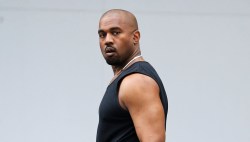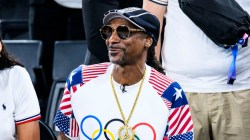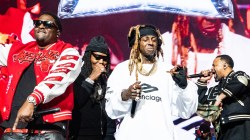“Slit the wrist of little sis / After she sucked the dick / I stabbed her brother with an ice pick / Because he wanted me to fuck him from the back / But Smallz don’t get down like that…” – Notorious B.I.G., “Dead Wrong”
What can you learn about black, male sexuality and judgment from Ashley Judd and Mister Cee? Well, there’s a purposely-loaded question that was intentionally phrased to make you pause. Yes, “pause”—as in that played out phrase that became so trendy whenever one of us flipped a homoerotic double-entendre.
To say that Internet culture moves fast would be a gross understatement. For all of the decidedly dumb statements you find on the HipHopDX comment boards, there’s a reason people still use one of them: “First!” Aside from having entirely too much time on their hands, the “First!” people are kind of on to something. Things move just that fast these days. The spoils and page views go to the outlet that finds the story first. That’s why last week, as news broke of two distinctly different situations—both interesting for totally different reasons broke—I took to the idea of waiting. As most of us know by now, the NYPD provided a report of Mister Cee receiving fellatio from another man in public, and Ashley Judd called Hip Hop misogynistic “rape culture.”
The two stories were unrelated, but both touched on two taboo topics in Hip Hop. Interestingly enough, we can use the late Notorious B.I.G. as the link between both. Notorious B.I.G. represented everything we love about Hip Hop—for better or worse. Songs like “Juicy,” “Everyday Struggle” and “Kick In The Door” represent the apex of male, emcee bravado. This is the shit Hip Hop was built on: the element of battling another emcee. Simply put, “I’m better than you and this is why.” You also got examples of urban plight on “Sky’s The Limit” and “Things Done Changed.” Add in Biggie’s gift for storytelling, and the emotional range of tracks like “Missing You,” and you get the full package.
That same competitive nature is why there has never been (and likely never will be) an openly mainstream homosexual rapper. The stereotypes that make Biggie acceptable are the opposite stereotypes associated with homosexuals. And this is where Mister Cee comes in. Mister Cee was an influential figure early in Biggie’s career. When Big Daddy Kane’s career was at its apex, Mister Cee was his deejay. Cee’s a tastemaker who made legendary contributions to our culture, and last week the police just so happened to furnish a report insinuating that he had sex with another man on at least one occasion.

AD LOADING...
Is what happened between Mister Cee and Lawrence Campbell any of our business? Well, yes and no. Yes because it’s public record, and the law provides for you to get a written police report of the incident, if you’re interested in what two grown men do with their mouths and penises inside of a parked car. Are you? You have to laugh at the hypocrisy of how everyone is yelling “pause” and “no homo,” yet the Mister Cee story was easily our most trafficked story last week. In a larger context, my answer to the aforementioned question is no. What Mister Cee does or doesn’t do behind closed doors doesn’t make him a better or worse deejay. It doesn’t take away from the classic work he did with Big Daddy Kane and Notorious B.I.G.
I’m more upset at Mister Cee’s peers who attempted to chastise us for being judgmental. Where was this newfound moral grandstanding when Karrine Steffans was telling every radio personality within earshot about how she inserted a couple fingers inside of Big Tigger’s ass? Was there any respect for Soulja Boy’s privacy when Kat Stacks was calling him an impotent cocaine addict? You can make a successful yet subjective argument that neither Big Tigger nor Soulja Boy’s contributions to Hip Hop are as significant as Mister Cee’s. But for these radio personalities to say they didn’t talk about Mister Cee’s arrest because they were practicing ethical journalism is Grade A bullshit. They didn’t report the story because Mister Cee is a friend, co-worker and business associate. And for any of us to believe otherwise is patently naïve.
“Smack the bitch in the face / Take the Gucci bag and her Northface off her back / Jap her if she act / Funny with the money / Oh you got me mistaken honey / I don’t wanna rape ya / I just want the paper…” –Notorious B.I.G., “Dead Wrong”
As far as I can tell, The New York Post was the first media outlet to break the news of Ashley Judd stating, “As far as I’m concerned, most rap and hip-hop music—with its rape culture and insanely abusive lyrics and depictions of girls and women as ‘ho’s’—is the contemporary soundtrack of misogyny.” In Judd’s defense, those were just 32 words out of a 400-page book. But you have to wonder if anyone ever played her “Infamous Date Rape” by A Tribe Called Quest.

AD LOADING...
Much like Judd’s chosen profession of acting, Hip Hop has a lot of indefensible works that at worst promote misogyny. In some cases, a song like Capone-N-Noreaga’s “Parole Violators” features Tragedy Khadafi mentioning an actual rape by rhyming, “War Report / Cut your life short / You Babe Ruth niggas ain’t ready for blood sport / Yo we mask up / Pointing the heat / Duct Taping her / Gag her mouth so she can’t scream / Start raping her / Camcorder / You can’t miss it cuz we taping her / Raping her / Raping her…”
For an added bonus we can throw in DMX’s “X Is Coming,” where DMX rhymes, “I ain’t knocking on the door / I’m coming in the house / And I’m gunning for your spouse / Trying to send that bitch back to her maker / And if you got a daughter older than 15 / I’ma rape her.”
See what I did there? Those are arguably two of the most misogynistic rhymes I could find. In full context they’re both about fictional situations, but that doesn’t make them any less disturbing and outright fucked up. It’s safe to say Judd never heard either song, and me saying those two songs are a proper and total representation of Hip Hop is wrong.
Have you seen the movie Unfaithful? In one scene, Oiver Martinez’s character (Paul Martel) begins to rape Diane Lane’s character (Connie Summer). She begins smiling mid-coitus and the rape turns into consensual sex. The movie is billed as a Drama. The movies Kiss The Girls and Natural Born Killers are also billed as Dramas (Judd’s scene from Natural Born Killers was deleted). Judd was paid for her roles in both movies. By Judd’s logic, you can judge all Drama’s by the same standard that you judge Unfaithful. But you shouldn’t have to take her argument to its extreme to see how flawed it is.

AD LOADING...
Judd later apologized for her comments, and I think that was a huge step in the right direction. But I also don’t think Judd knew just how damaging her comments were. Let’s lay the facts out. Judd is a white woman who was raised in Kentucky. Hip Hop is a genre predominately performed by black men. For Judd to insinuate that Hip Hop promotes misogyny and rape culture harkens back to the days of when black men were lynched and castrated for sexual relationships with white women—consensual and or imagined. Am I the only one that saw that connection?
When Judd made her statements, you have to wonder if she thought about that and how it has implications way beyond Hip Hop. I don’t think Judd is racist. I think she put her foot in her mouth, and her rush to uneducated judgment is a symptom of the problem our entire culture currently has. I sincerely hope that someone brings the Jim Crow connection to her attention. This incident should end with more learning that just her being introduced to “artists whose lyrics embody activism and progressive values” and “more beats for [her] playlists.”
Taboo topics like rape, traditional gender roles and (gasp!) homosexuality are conveniently swept under the rug far too often everyday. The stereotypes about these topics are in place because people are scared to openly talk about them. If one of Hip Hop’s most influential deejays is caught having oral sex in public with another man, what does that mean about male bravado in Hip Hop? If one of America’s sweethearts can conjure up images of Jim Crow with one stroke of the pen, what does that say about Hollywood? And if there are vivid, even fictional images of rape on two Hip Hop albums that are critically acclaimed, what does that say about us as fans? In that context, who gives a fuck about someone getting a blowjob in a car on a corner? As an entire society, there are much bigger issues that should give us pause.
***Correction: April 14, 2011***

AD LOADING...
This editorial has been revised to reflect the following correction:
Omar Burgess misstated Viggo Mortensen’s role of the movie Unfaithful. The male character of Paul Martel was played by Oliver Martinez, not Viggo Mortensen.
Omar Burgess is a Long Beach, California native by way of Flint, Michigan. In addition to contributing to various magazines and newspapers, he is an editor at HipHopDX.com.



